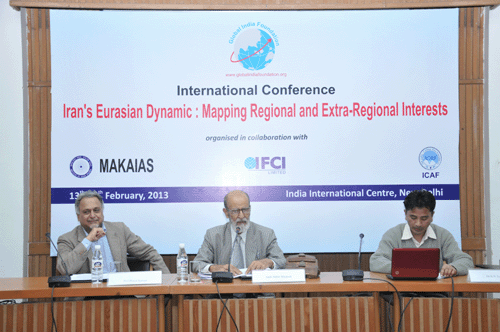 |
|
|
Global India Foundation International Conference Iran’s Eurasian Dynamic: Mapping Regional and Extra-Regional Interests, 13th-14th February 2013, New Delhi, India Global India Foundation under the auspices of the trilateral cooperation with Maulana Abul Kalam Azad Institute of Asian Studies (MAKAIAS) and the India-Central Asia Foundation (ICAF) organised an International Conference on ‘Iran’s Eurasian Dynamic: Mapping Regional and Extra-Regional Interests’ at the India International Centre on 13h and 14th of February 2013. The Conference was supported by Maulana Abul Kalam Azad Institute of Asian Studies and IFCI. The two day deliberations saw the coming together of Iranian, Indian and Eurasian viewpoints on the pertinent theme of Iran’s role in the Eurasian region and the attendant ramifications thereof. 14 academic papers were presented at the Conference on the broad themes of Iran in Eurasia, Iran and Energy Politics, India-Iran Relations, Iran and Extra-Regional Players, Iran’s Current Dynamics. (A) (C) (Pic
A to C-Inaugural session): Prof.Omprakash Mishra
(Member Secretary, GIF), Vice Admiral P.J.Jacob (Chairman,
GIF) Following initiation by Vice Admiral P.J.Jacob(Chairman, GIF), who Chaired the Inaugural Session, opening remarks were made by Mr.K.Santhanam(President, ICAF) and Dr.Sreeradha Datta (Director, MAKAIAS) both of whom re-iterated the relevance of the Eurasian space and the importance of a collaborative venture akin to the one MAKAIAS-GIF-ICAF enjoy for furthering the cause of Eurasian studies. The Session was then addressed by Mr.Anil K.Agarwal (Past President, ASSOCHAM) who expounded the relevance of the economic dimensions in India’s engagement with Iran. The Conference was then inaugurated by Hon’ble Minister of External Affairs Shri Salman Khurshid. While lauding the efforts of Global India Foundation in organizing a venue for dissemination on the important subject, Shri Khurshid significantly pointed out that India stands at the forefront of countries that appear to be in a position to give Iran the kind of support that would be needed in the "very very critical and crucial discussions and dialogue that Iran needs to do.” The Inaugural Session ended with a Vote of Thanks proposed by Prof.Omprakash Mishra. The first Business Session on ‘Iran in Eurasia’ was chaired by Prof.R.Gidadhubli. Prof.Farhad Atai spoke on the subject of ‘The South Caucasus: opportunities and challenges for Tehran’ and enumerated the varying facets of Iran’s interest in the region. The second presentation was by Dr.Sanjay Pandey, who in his paper on ‘Iran in Central Asia’ outlined the historical narrative of Iran’s involvement in Eurasia and the contemporary dynamics of that interaction. The third paper of the Session was presented by Ms.Anwesha Ghosh who in her paper on ‘Iran’s Balancing Act in Afghanistan: Amidst Turbulence and Transitions’ offered a critical examination of Iran’s engagement and influence in the fluid Afghan context. Prof.Ajay Patnaik presented the final paper in the Session and in his commentary on ‘Iran’s Significance in India’s Eurasia Policy’, provided a broad overview of India’s own interests in the region and about the impact that Tehran’s policy has on the sphere. (D) (D) - Dr.Sanjay Pandey , Prof.Farhad Atai, Prof.R.Gidadhubli, Prof.Ajay Patnaik , Ms.Anwesha Ghosh, (E) Prof.R Gidadhubli, Mr. K. Santhanam, Prof.Girijesh Pant The
Second Business Session on the theme of ‘Iran and Energy
Politics’ was Chaired by Mr.K.Santhanam. Prof.Gidadhubli
presented a paper on ‘Great Game in the Caspian Region:
Implications for India’s Energy Scenario’, wherein
a detailed study was made of the geopolitics and geo-economics
of competition in the Caspian region for conceiving alternative
competitive pipeline networks such as BTC, Nabucco, South
Stream etc. from the Caspian region to global markets in the
West as well as towards China in the East. The second presentation
was made by Prof.Girijesh Pant who in his paper on ‘Changing
Global Energy Map: Implications for Iran’ outlined most
definitively the politics of energy and the coordinates in
the energy debate that both Iran and India need to take cognizance
of. (F) (F) Dr. Mandana Tishehyar, Vice Admiral P J Jacob, Dr.Asif Shuja, Dr.Lopamudra Bandyopadhyay (G) Dr. Masud Imani Kalesar, Prof. Farhad Atai, Ms.Sylvia Mishra
(H) (H) Ms. Cauvery Ganapathy, Brigadier Devinder Singh, Lt. Gen. A S Lamba, Dr Sreeradha Datta, Dr.Sunil Chacko (I) Prof. Bharat Karnad, Amb.Akbar Khaleeli, Dr.K.N.Tennyson The final Business Session centered on the broad theme of ‘Iran: Current Dynamics, 2013’. The Session was Chaired by Prof.Farhad Atai. Dr.Masoud Imani Kalesar in his presentation on ‘Iran’s 2013 New President: New Policies on Nuclear Crisis & Arab Spring?’, delved into the substantive issues that have been plaguing Iran in the recent past, such as the opposition to its nuclear programme, the economic embargo and the attendant crippling of the Iranian economy, domestic discontent et cetera. The second presentation of the Session was made by Ms.Sylvia Mishra who spoke on the subject of ‘Iran in 2013: Nuclear and Oil Politics’. Ms.Mishra outlined three significant facets of the subject by considering the indices of energy politics as drivers of security, identifying the contours of nuclear politics and oil politics and their ramifications and finally, analyzing public opinion on Iran’s nuclear programme across the world. The Concluding Session of the Conference was Chaired by Lt.Gen.Lamba. The panel comprised of Brigadier Devinder Singh, Dr.Sreeradha Datta, Dr.Sunil Chacko and Ms.Cauvery Ganapathy. The session focused on providing a summary of the deliberations held over the two day Conference and drawing a roadmap to actualize the potential identified through the exchange of views. The panel agreed upon the creation of a substantive report on the proceedings so as to enumerate the pertinent issues and their answers as an outcome of the Conference. |
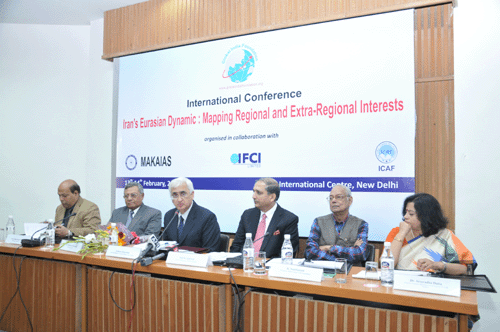 (B)
(B) 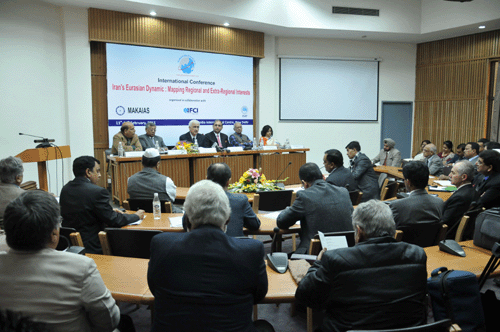
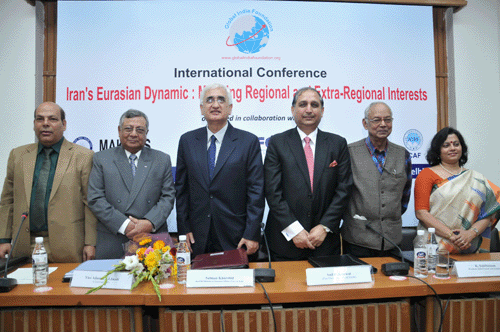
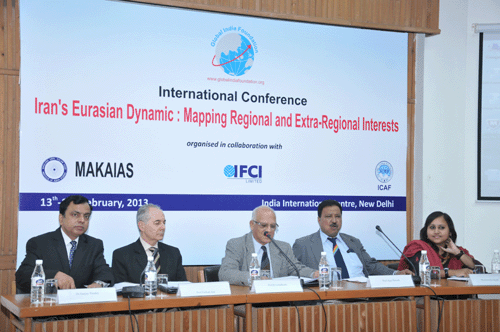 (E)
(E) 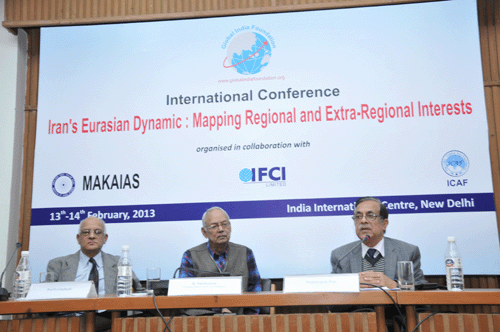
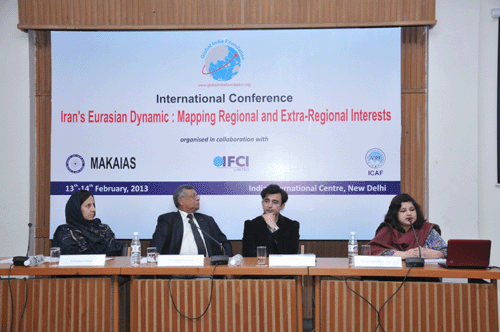 (G)
(G) 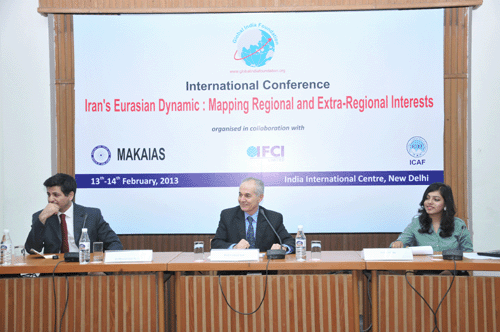
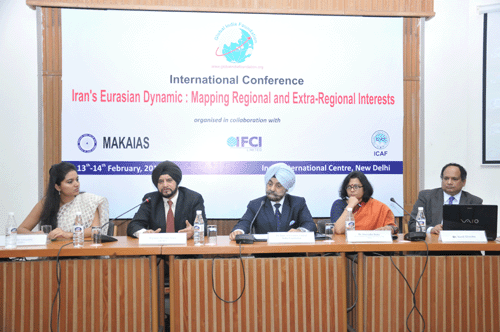 (I)
(I) 